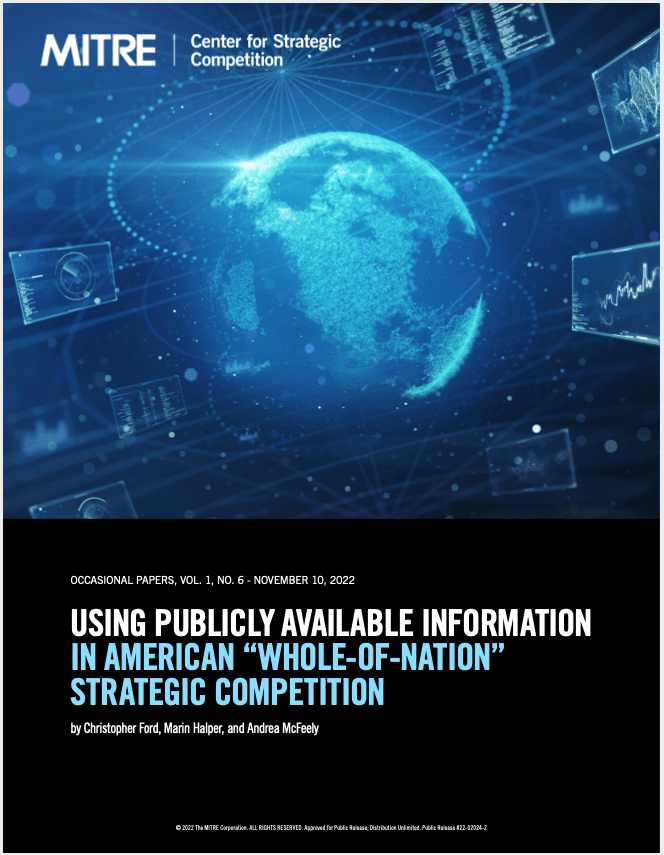Using Publicly Available Information in American "Whole of Nation" Strategic Competition
MITRE's Center for Strategic Competition published its sixth Occasional Paper on November 10, 2022. It offers a look at the possibilities for using analysis of publicly-available information (PAI) to support U.S. competitive strategy, an exploration of some of the governance challenges in this arena, and offers suggestions about how to improve the U.S. Government's ability to take advantage of PAI analytics in ways consistent with American values. Authored by Christopher Ford, Marin Halper, and Andrea McFeely, this paper can be found here, or can be downloaded by using the button below.

From the Executive Summary:
“U.S. leaders today find themselves facing an increasingly diverse array of ‘whole-of-nation’ (WON) challenges—that is, problems that have broad, cross-cutting or even systemic effects, and that cannot be addressed by any given government department or agency, or even the federal government itself, acting entirely on its own. ...
“A growing ecosystem of data aggregators, analysts, and artificial intelligence-enabled (AI) methodologies now exists to collect and help understand revealing patterns that may exist in the ‘digital exhaust’ of
the modern information economy—data which can provide the informational foundation upon which to build effective responses to such ‘wicked problems’ at the national level. ...
“The category of ‘publicly available information’ (PAI) is crucial to success in these regards, both because under current rules it is the category of information most sharable across the U.S. government, and because PAI makes up most of the nontraditional data presently available in the commercial marketplace. ...
“... [T]he greatest national challenges the United States faces—among them climate change and strategic competition with China—involve cross-cutting substantive questions and policy issues in which a kaleidoscope of stakeholders must both understand their environment and act together effectively in support of some shared vision of American success. For this, the current governance model may not be enough. Merely sticking with the status quo would not preclude all efforts to undertake data analytics to support policymaking in the face of America’s ‘wicked problems,’ but it would be inefficient, costly, and inadequate for the scope of today’s challenges. ...
“This paper suggests that such a pilot program begin with an effort to help secure America’s critical supply chains against foreign adversary control or manipulation and offers suggestions for a new legislative framework that could accomplish the necessary harmonization in this arena. It also offers a tentative suggestion for a ‘Code of Ethical Conduct in the Use of Publicly Available Information’ that could be promulgated as an articulation of best practices for the ethical employment of PAI.”









